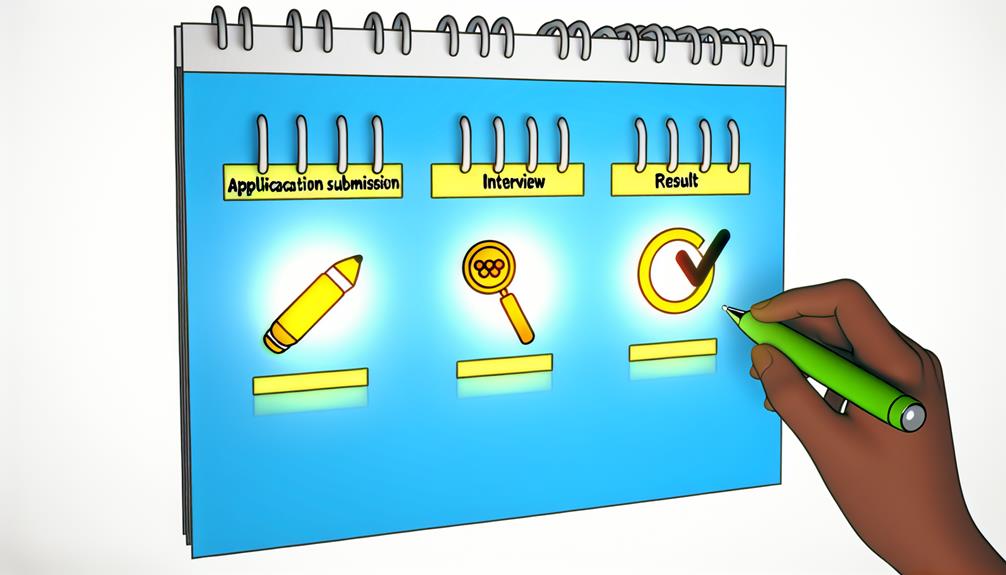Navigating the college admission process is much like plotting a journey through a vast, unfamiliar landscape; it's daunting, complex, and filled with numerous milestones.
You're probably wondering when you should start preparing, which standardized tests to take, how to craft an outstanding application, the ins and outs of the interviewing process, and how to decode admission decisions.
We're about to embark on a comprehensive review of these crucial steps.
You don't want to miss the chance to glean valuable insights that could potentially illuminate your path to your dream college, do you?
Understanding High School Preparation
To set yourself up for success in the college admissions process, it's crucial to begin your preparations during high school, focusing on academics, extracurricular activities, and developing key skills.
One of the most important areas to concentrate on is your course selection strategies. It's not enough to simply choose classes that sound interesting; you need to carefully plan out your academic path to ensure you're taking the most challenging, relevant courses available. Colleges value students who push themselves and demonstrate a depth of knowledge in their chosen fields.
Equally important is your extracurricular involvement. Don't just join clubs to pad your resume, but actively participate and seek leadership roles. These activities show colleges that you're engaged and committed, traits they highly value. Also, they provide a well-rounded education and develop skills that aren't always covered in the classroom.
Additionally, consider volunteering or getting a part-time job. These experiences can further demonstrate your work ethic and commitment, and give you real-world skills that can be invaluable in college and beyond.
Navigating Standardized Tests
Mastering standardized tests, such as the SAT or ACT, is a critical component of your college admissions journey, as these scores often play a significant role in admission decisions. To conquer these tests, you'll need to develop effective test preparation strategies.
Start early, ideally several months before the test date. Familiarize yourself with the test format and types of questions you'll encounter. Regular practice tests can help you identify areas of strength and those that need improvement. It's also beneficial to review test-taking techniques, such as time management and the process of elimination for multiple-choice questions.
Upon receiving your scores, understanding score interpretation is crucial. Each test has its own scoring scale, and colleges may place more weight on certain sections. High scores in areas related to your desired major can strengthen your application. However, don't be disheartened if your scores aren't as high as you'd like. Many colleges consider other aspects of your application, such as your GPA, extracurricular activities, and personal essays, just as important.
Crafting the Perfect Application
While your standardized test scores certainly carry weight, it's your college application that truly enables you to showcase your individuality, experiences, and aspirations. This document is your platform to illustrate your uniqueness and potential, so it's crucial to craft it meticulously.
The first step is understanding the application essentials. Typically, this includes your transcript, recommendation letters, extracurricular activities, and standardized test scores. However, don't forget about the personal statement—it's your chance to tell your story.
Personal Statement brainstorming is a critical step. Consider your significant experiences, core values, and ambitions. Reflect on challenges you've overcome, projects you're proud of, or moments that have shaped your perspective. This isn't just about boasting your achievements—it's about presenting a genuine portrayal of who you're and who you aspire to be.
Crafting the perfect application isn't an overnight process. It demands time, thought, and sincere effort. So start early, revise often, and seek feedback. Remember, the goal isn't just to impress admission officers but to give them a glimpse into your journey, dreams, and potential.
Demystifying Interview Process
Navigating the college interview process can seem like a daunting task, but with meticulous preparation and a clear understanding of what admissions officers are looking for, you can turn this challenge into a golden opportunity to further distinguish yourself.
Firstly, consider your interview attire. Dressing appropriately is a vital part of making a positive first impression. While it's not necessary to wear a full suit, aim for business casual. Avoid loud colors or flashy accessories. You're aiming to project an image of maturity, responsibility, and ambition.
The interview itself is your chance to showcase your personality, goals, and dedication. Be prepared to discuss your academic achievements, extracurricular activities, and future plans. Don't forget to prepare some thoughtful questions of your own to show your genuine interest in the college.
Lastly, don't underestimate the importance of follow-up etiquette. A concise, polite email thanking the interviewer for their time not only shows good manners, it also keeps you in the interviewer's mind. Remember to send this within 24 hours of your interview.
With these tips in mind, you're well on your way to acing the college interview process.
Decoding Admission Decisions
After acing your college interview, the next step in your journey is understanding the college admission decisions, a crucial aspect that can often seem enigmatic and stressful. You'll probably experience a whirlwind of decision emotions, ranging from anxiety and anticipation to relief or disappointment.
Decoding admission decisions starts with recognizing the three possible outcomes: acceptance, rejection, or waitlist. An acceptance is cause for celebration, affirming that your hard work has paid off. However, you must also be prepared for rejection. It's natural to feel disappointed, but rejection handling is essential for personal growth. Remember, a rejection isn't a reflection of your worth, merely a decision based on numerous factors, some beyond your control.
Being waitlisted is a more ambiguous situation. It means you're still in consideration, but the college needs more time or information before making a final decision.
Through all these decision emotions, it's important to maintain perspective. Each college decision represents an opportunity, whether it's the chance to attend a preferred college, learn from rejection and improve, or hone your patience while on a waitlist. Ultimately, understanding and navigating the admission decisions will pave the way for your future academic pursuits.
Conclusion
By understanding your high school preparation, navigating standardized tests, crafting that perfect application, and decoding admission decisions, you've taken giant strides towards deciphering the college admission process.
Don't let the interview process intimidate you. Instead, see it as an opportunity to show your passion, commitment, and values.
With the right approach, you'll soon find the college admission process isn't as daunting as it seems. You're on your way to a bright future!








